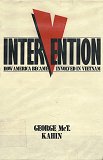KAHIN : Intervention (fülszöveg)
From our most distinguished authority on Southeast Asian politics – a comprehensive and provocative study that changes our understanding of how the United States became committed to the war in Vietnam, and that gives us an entirely new picture of the role played by President Lyndon Johnson.
Intervention departs significantly from other books about Vietnam and offers fresh revelations. Basing his account on newly declassified government documents from Washington and London, and on interviews with many officials, George Kahin traces the roots of American involvement back to the months just after World War II when British forces occupied southern Indochina (they held the colony "in place" until the French were ready to restore their prewar government), and to the covert, unofficial aid supplied the French by the Truman administration, beginning in 1946. And as the political events of the following twenty years unfold, we see how the interaction between United States policies and the internal Vietnamese situation crucially influenced American intervention in Southeast Asia.
Kahin shows, with specific and detailed examples, how the nature and magnitude of American political and military involvement strongly affected the character of political life in Vietnam. He explains the true origin and character of the insurgent National Liberation Front (giving us the fullest picture we have of what the American forces were up against) . . . the reason behind American support of the 1963 coup that resulted in the assassination of President Ngo Dinh Diem and his brother . . . how General Paul Harkins helped organize the 1964 coup against General Duong Van Minh without informing Ambassador Henry Cabot Lodge . . . how the Buddhist leadership could probably have established an antiwar government in Saigon in 1966 if Washington had not intervened physically against the movement, and helped crush it.
One of the most engrossing highlights of the book is Kahin's portrait of Lyndon Johnson as the last dove in his administration. Here is President Johnson, unwilling throughout the summer, fall, and early winter of 1964–65 to begin extensive bombing raids on North Vietnam – reluctant for neither moral nor high-minded reasons but simply because he saw no viable government to support in Saigon – yet eventually bowing to what he believed to be the greater expertise in foreign affairs of various top advisers; taking a stand, on their advice, that meant irreversible intervention. And by 1967, as Kahin makes clear, U.S. policy was locked into a course that would take the United States through eight more years of war.
Intervention is an insightful, fascinating book that sheds substantial new light on the lasting and complex argument over America's participation in the Vietnam War.
|
|

|
|
| KATALÓGUS | TARTALOM |